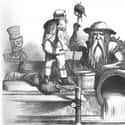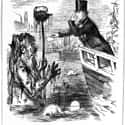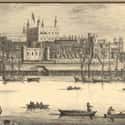-
(#4) A Heat Wave In 1858 Made The River's Condition Unbearable
With centuries worth of waste built up in the Thames, as Michael Faraday predicted, it was only a matter of time before the situation would demand attention. That came in June of 1858, when a heat wave in London made it impossible to ignore the sewage any longer. An extended dry spell made the river slow nearly to a stop, and the summer heat began to cook the fetid waters.
The smell that emerged consumed the city of London. Prime Minister Benjamin Disraeli called the river "a stygian pool reeking with ineffable and unbearable horror." Reports said that miles away, townsfolk would be moved to vomit any time the wind changed. The smell was so terrible that it forced Parliament to take action, drenching their curtains in chloride of lime to quell the stink. When not even that worked, the path forward was clear—something would need to be done about the reeking river.
-
(#7) Cesspits Leached Directly Into The Ground
Before sewage treatment, human waste didn't really have anywhere to go. That meant that, before the creation of London's sewer system, cesspits that weren't emptied leached directly into the soil and eventually into the Thames. With time, even the waste that wasn't dumped directly into the river eventually made its way into the waters. By the year of the Great Stink, the entirety of London was sitting on ground contaminated by sewage.
-
(#10) Treating The Problem Cost The City Tons Of Money
Before London could agree on a fix for the Thames, they tried treating the symptoms. Whether that was individuals buying scented handkerchiefs or Parliament coating their curtains in chlorine, the people of London had to find a way to avoid the smell, which reportedly caused people miles away to vomit. The city resorted to dumping £1500—in todays USD, that's over $100,000—worth of chloride of lime into the river to cover, not treat, the stench. Chloride of lime is itself poisonous, so it only ended up adding to the river's toxicity.
-
(#3) The River Thames Was In A Thick and Cloudy Mess In 1858
Because of the rise in population, the increased amount of waste pouring into the Thames, and the lack of cleanup effort, the river was in a horrific state by 1858. The city had grown with no meaningful changes to its sewer system, and the Thames was the city's main source of drinking water. With hundreds of years of garbage, human and industrial waste polluting it, the river was thick, brown, and opaque. Scientist Sir Michael Faraday warned the public of this in 1855, writing, "if we neglect this subject [then] a hot season [will] give us sad proof of the folly of our carelessness," which proved true during The Great Stink three years later.
-

(#8) Advances In Plumbing Worsened The City's Sewers
The spread of flush toilets became a luxury for cramped city-dwellers who would sometimes have to go down into their basements whenever they needed to use the bathroom, but it also put an enormous strain on the outdated sewer system. While cesspits were designed to contain an average home's waste, flush toilets were filling the same cesspits with more water and excrement. This meant they were more likely to flood homes, increasing the risk for disease. Eventually these cesspits were connected to the city's sewers, which were originally intended for rainwater—the result was that waste flooded the sewers and was carried directly to the River Thames, exacerbating an existing stink.
-
(#6) Londoners Tried To Convince Parliament To Take Action Before The Great Stink
The Thames was so badly polluted that it was opaque even before the summer of 1858. By 1855, pieces of paper dropped into the river disappeared after sinking only an inch. Sir Michael Faraday wrote a letter to The Times of London to call attention to the dire conditions of the Thames:
In order to test the degree of opacity, I tore up some white cards into pieces, moistened them so as to make them sink easily below the surface, and then dropped some of these pieces into the water at every pier the boat came to; before they had sunk an inch below the surface they were indistinguishable, though the sun shone brightly at the time...Near the bridges the feculence rolled up in clouds so dense that they were visible at the surface, even in water of this kind.
The smell was very bad, and common to the whole of the water; it was the same as that which now comes up from the gully-holes in the streets; the whole river was for the time a real sewer...I have thought it a duty to record these facts, that they may be brought to the attention of those who exercise power or have responsibility in relation to the condition of our river; there s nothing figurative in the words I have employed, or any approach to exaggeration; they are the simple truth. If there be sufficient authority to remove a putrescent pond from the neighbourhood of a few simple dwellings, surely the river which flows for so many miles through London ought not to be allowed to become a fermenting sewer.
New Random Displays Display All By Ranking
About This Tool
When talking about the most famous and beautiful river in London, it must be the Thames with a history of 30 million years. However, few people know that the stench on the Thames was unbearable in the 19th century. Local people have to keep doors and windows closed, especially at night. In the Elizabethan era, the British dumped urine and feces directly on the streets and rivers in London. Until the 19th century, the Victorian era was also the Great Stink.
It is conceivable that the river and surrounding areas will smell terrible in hot weather, and people were using the Thames as drinking water, when the smell and disease became serious, the British government finally developed a sewer system. The random tool lists 12 facts about the Great Stink.
Our data comes from Ranker, If you want to participate in the ranking of items displayed on this page, please click here.















